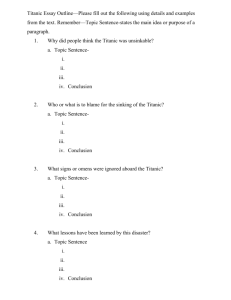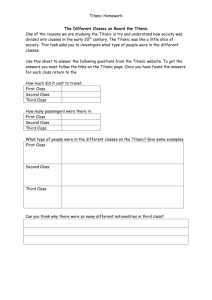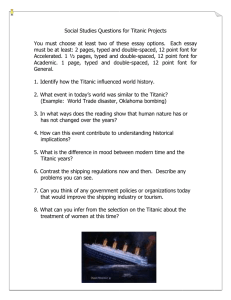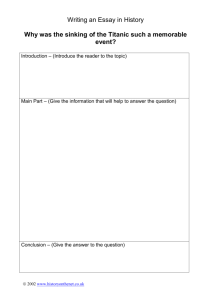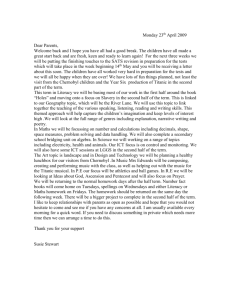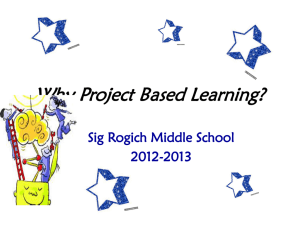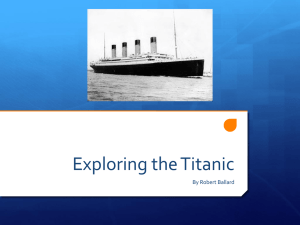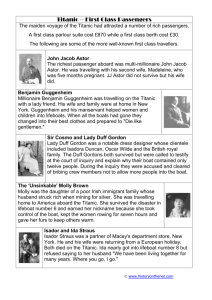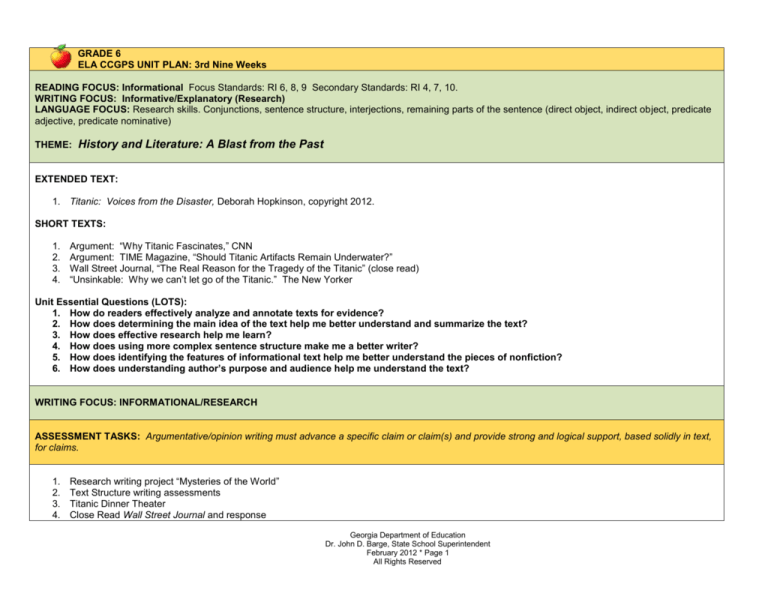
GRADE 6
ELA CCGPS UNIT PLAN: 3rd Nine Weeks
READING FOCUS: Informational Focus Standards: RI 6, 8, 9 Secondary Standards: RI 4, 7, 10.
WRITING FOCUS: Informative/Explanatory (Research)
LANGUAGE FOCUS: Research skills. Conjunctions, sentence structure, interjections, remaining parts of the sentence (direct object, indirect object, predicate
adjective, predicate nominative)
THEME:
History and Literature: A Blast from the Past
EXTENDED TEXT:
1. Titanic: Voices from the Disaster, Deborah Hopkinson, copyright 2012.
SHORT TEXTS:
1.
2.
3.
4.
Argument: “Why Titanic Fascinates,” CNN
Argument: TIME Magazine, “Should Titanic Artifacts Remain Underwater?”
Wall Street Journal, “The Real Reason for the Tragedy of the Titanic” (close read)
“Unsinkable: Why we can’t let go of the Titanic.” The New Yorker
Unit Essential Questions (LOTS):
1. How do readers effectively analyze and annotate texts for evidence?
2. How does determining the main idea of the text help me better understand and summarize the text?
3. How does effective research help me learn?
4. How does using more complex sentence structure make me a better writer?
5. How does identifying the features of informational text help me better understand the pieces of nonfiction?
6. How does understanding author’s purpose and audience help me understand the text?
WRITING FOCUS: INFORMATIONAL/RESEARCH
ASSESSMENT TASKS: Argumentative/opinion writing must advance a specific claim or claim(s) and provide strong and logical support, based solidly in text,
for claims.
1.
2.
3.
4.
Research writing project “Mysteries of the World”
Text Structure writing assessments
Titanic Dinner Theater
Close Read Wall Street Journal and response
Georgia Department of Education
Dr. John D. Barge, State School Superintendent
February 2012 * Page 1
All Rights Reserved
(3 of 4 must be argumentative)
NARRATIVE/RESEARCH/ROUTINE WRITING
NARRATIVE
1. Titanic Dinner Theater
RESEARCH CONNECTIONS or PROJECTS:
1.
2.
3.
4.
5.
Research project – Mysteries of the World
Time Capsule Project
Short research projects using specific text structures
Titanic Webquest featuring National Geographic
Differentiated research project for gifted: lapboards
ROUTINE WRITING Notes, summaries, process journals, and short responses across all genres
Reading response journal
“Pump It Up” Friday
Daily Oral Language sentences. paragraphs and assessments
Use It or Lose It
Summarizing activities
PLANS FOR ASSESSMENT 1: integrating reading selections from the unit into a writing task
Research Writing Project: “Mysteries of the World”
SKILL BUILDING TASKS
Note: tasks may take more than a single day. Include a task to teach EVERY skill students will need to succeed on the assessment prompt above. Language,
Foundations, and Speaking/Listening standards must be incorporated so that all standards are adequately addressed throughout the year.
ESSENTIAL QUESTION:
How does effective research help me learn?
How do readers effectively analyze and annotate texts for evidence?
Georgia Department of Education
Dr. John D. Barge, State School Superintendent
February 2012 * Page 2
All Rights Reserved
TASK: Construction of a research paper using peer-reviewed journals, published sources, and web resources to gain information about an urban
legend.
Standards:
ELACC6W7: Conduct short research projects to answer a question, drawing on several sources and refocusing the inquiry when appropriate.
ELACC6W8: Gather relevant
information from multiple print and digital sources; assess the credibility of each source; and quote or paraphrase the data and conclusions of others while avoiding
plagiarism and providing basic bibliographic information for sources.
ELACC6W9: Draw evidence from literary or informational texts to support analysis, reflection, and research.
a. Apply grade 6 Reading standards to literature (e.g.,
“Compare and contrast texts in different forms or genres [e.g., stories and poems; historical novels and fantasy stories] in terms of their approaches to similar themes and
topics”).
b. Apply grade 6 Reading standards to literary nonfiction (e.g., “Trace and evaluate the argument and specific claims in a text, distinguishing claims that are
supported by reasons and evidence from claims that are not”).
KNOW and UNDERSTAND (What students
must know and understand based on LOTS)
Students will understand that not all sources are
reliable.
Student will understand plagiarism.
Students will understand the writing process and
the importance of a “hook” and closure.
Students will understand that informational writing
is more powerful with relevant data and
information.
Students will know that academic research papers
include a bibliography.
Students will know that collaboration and sharing
of academic information is important in the school
environment.
DO (What students must do based on LOTS)
Students will evaluate several types of resources
and be able to articulate the reliability of said
sources.
Students will produce a final draft including
appropriate citations for any outside text used.
Students’ final drafts will engage the reader with
an interesting introduction and satisfying closure.
Students will include relevant information and data
in their final product.
Students will cite all sources using proper MLA
bibliography format. They will cite in MLA format,
however, will be able to use other formats.
Students will make presentations using
appropriate eye contact, adequate volume, and
clear pronunciation while presenting ideas
logically.
BALANCED ASSESSMENTS:
Pre-Assessment and/or Diagnostic:
Vocabulary Pretest
Formative:
Georgia Department of Education
Dr. John D. Barge, State School Superintendent
February 2012 * Page 3
All Rights Reserved
Bloom’s or DOK—Based on the action of the
student
Developing research questions
Prewriting
Rough draft
Revising
Editing
Summative:
Final writing task
Presentation
DIFFERENTIATION:
Scaffolding:
Small group
Peer editing
Teacher conferencing
Modified length
Gifted Cluster and Enrichment:
Extension component for paper using multimedia extension.
Instruction Plan:
PLANS FOR ASSESSMENT 2
Titanic guided research: National Geographic Titanic Webquest
SKILL BUILDING TASKS
ESSENTIAL QUESTIONS:
How does effective research help me learn?
How does understanding author’s purpose and audience help me understand the text?
TASK: Read and discuss National Geographic’s Titanic site and related texts. Complete a guided reading activity and personal reflection, including questions
that explore critical reasoning, finding evidence, and making inferences.
Standards:
Georgia Department of Education
Dr. John D. Barge, State School Superintendent
February 2012 * Page 4
All Rights Reserved
LACC6RI1: Cite textual evidence to support analysis of what the text says explicitly as well as inferences drawn from the text.
ELACC6RI2: Determine a central idea of a text and how it is conveyed through particular details; provide a summary of the text distinct from personal opinions
or judgments.
KNOW and UNDERSTAND (What students
must know and understand based on LOTS)
Students will understand that primary sources
such as Titanic artifacts give us a glimpse into the
culture of its time and place in history.
Students will understand how routine writing can
improve their writing.
DO (What students must do based on LOTS)
Bloom’s or DOK—Based on the action of the
student
Students will explore the Titanic website and
make personal and research connections to the
content.
Students will write routinely in a journal,
chronicling and reflecting upon current events and
culture.
BALANCED ASSESSMENTS:
Pre-Assessment and/or Diagnostic:
Formative:
Titanic KWL to determine prior knowledge
Timeline
Routine reflections/predict, argue, explain, reflect
Summative:
Selected response reading comprehension
Journal
QPA 3rd Nine Weeks
DIFFERENTIATION:
Scaffolding:
Small group instruction, lunch study/discussion group.
Gifted Cluster
Students will choose from a variety of activities which may include (but not limited to) reading Among the Hidden (Haddix series) or will research and
extend knowledge about Anne Frank or World War II and present to classmates. Other opportunities may include presenting/dramatizing other stories
of children at risk in Bosnia, Darfur, etc.
PLANS FOR ASSESSMENT 3:
PROMPT: How can we turn our emotional reactions to the events of the Titanic tragedy into a personal statement using poetry?
Georgia Department of Education
Dr. John D. Barge, State School Superintendent
February 2012 * Page 5
All Rights Reserved
SKILL BUILDING TASKS:
ESSENTIAL QUESTIONS:
TASK: Students will create a poetry anthology centered around art and media of the Titanic.
Standards:
KNOW and UNDERSTAND (What students
must know and understand based on LOTS)
Students will understand that culture is impacted
by propaganda, political cartoons, and the arts.
Students will understand the importance of
author’s purpose in text relating to the Titanic.
Students will know that figurative and sensory
language allows writers to express emotion
and message in few words.
DO (What students must do based on LOTS)
Students will view an artifacts from the time period
and be able to make historical connections to the
texts of the unit, including exploring the
inaccuracies present in the aftermath of the
disaster.
Students will view an artifact from the time period
(engaging and relevant in the present day) and
reflect on its message and the intent/purpose of
the authors.
Students will create a poetry anthology inspired by
iconic images and primary source documents of
the Titanic tragedy
BALANCED ASSESSMENTS:
Pre-Assessment and/or Diagnostic:
Formative:
Found poetry graphic organizer
Short writing assignments
Poetry walk reflection
Summative:
Poetry anthology
DIFFERENTIATION
Gifted cluster:
Plan and implement “Poetry Walk” activity.
Georgia Department of Education
Dr. John D. Barge, State School Superintendent
February 2012 * Page 6
All Rights Reserved
Bloom’s or DOK—Based on the action of the
student
Scaffolding:
Modified assignment
Teacher conferencing
Slotted poetry or formula poetry activity
1. ESSENTIAL QUESTION
How does using more complex sentence structure make me a better writer?
TASK: Students will identify more complex sentence structure and use it effectively in their writing.
Standards:
KNOW and UNDERSTAND (What students
must know and understand based on LOTS)
Students will know the language of the standards
as it pertains to research.
TRANSITIONAL: Students will understand that
complex sentence structure adds variety and
makes writing more interesting.
Students will understand that the parts of a
sentence are important when choosing forms of
pronouns based on number and case.
DO (What students must do based on LOTS)
Students will be able to complete formative
assessments demonstrating that they can
effectively use key vocabulary such as citation,
bibliography, MLA, APA, plagiarism, peer-review
journal, primary source, secondary source, etc.
Students will identify sentence structure in unit
texts and will use compound and complex
sentences in their own writing.
Students will identify parts of a sentence such as
predicate nominative/adjective/direct object and
be able to choose correct subject or object
pronouns.
Students will be able to spell difficult words
correctly, both in drill and in prose.
Students will know the discrete differences
between commonly confused and commonly
misspelled words.
NOTE: May have to add more rows depending on the number of standards for the tasks.
BALANCED ASSESSMENTS:
Pre-Assessment and/or Diagnostic:
Pretest
Formative:
Practice worksheets
Practice using texts from units
Short writing activities
Georgia Department of Education
Dr. John D. Barge, State School Superintendent
February 2012 * Page 7
All Rights Reserved
Bloom’s or DOK—Based on the action of the
student
Summative:
Selected and constructed response tests
Instruction Plan: (Be sure to include in detail the role of the teacher and the role of the student.)
Include vocabulary (Tier 2 and 3).
Also, LABEL the Components of the TASK as Acquisition, Application, Assimilation, and/or Adaptation
Georgia Department of Education
Dr. John D. Barge, State School Superintendent
February 2012 * Page 8
All Rights Reserved

